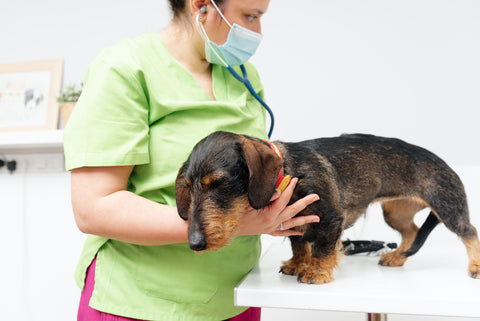Do Dogs Get Headaches? Understanding Dog Discomfort
As pet owners, we always want the best for our furry companions. When our dogs exhibit signs of discomfort or distress, it's only natural to be concerned. One common question that often arises is whether dogs can get headaches. While dogs can experience various health issues, including pain, it's essential to explore the topic of headaches in dogs to better understand their well-being.
A Dog's Pain in the Head: Exploring Headache Symptoms and Solutions
Can Dogs Get Headaches?
The simple answer is: yes, dogs can experience headaches. However, it's important to note that dogs may not experience headaches in the same way humans do. Unlike humans, dogs cannot communicate their feelings or sensations in words, making it challenging to pinpoint when they have a headache. Instead, we must rely on their behavior and other cues to infer whether they might be experiencing discomfort.

Understanding Dog Headache Symptoms
Since dogs cannot tell us when they have a headache, it's crucial to observe their behavior and look for possible signs of discomfort. Here are some common indicators that your dog might be experiencing a headache:
Change in Behavior: Dogs with headaches may become unusually irritable, anxious, or withdrawn. They might seek solitude or avoid interaction with their human family members and fellow pets.
Sensitivity to Light and Noise: Dogs with headaches might exhibit sensitivity to light and sound. They may prefer dimly lit rooms and quiet surroundings.
Head Pressing: Some dogs with headaches may press their heads against objects like walls or furniture. This behavior can be a sign of head pain or discomfort.
Decreased Appetite: Headaches can lead to a loss of appetite in dogs. If your dog suddenly refuses to eat or shows disinterest in their food, it could be a cause for concern.
Pawing at the Head: If your dog frequently paws at their head or ears, it could be an indication of discomfort in that area.
Changes in Sleep Patterns: Dogs with headaches may have difficulty sleeping or exhibit restlessness during their sleep.
Altered Gait: In some cases, dogs with headaches may have an unsteady or wobbly gait, which can be mistaken for balance issues.
What Causes Headaches in Dogs?
Several factors can contribute to headaches in dogs:
Illness or Infection: Headaches can be a symptom of underlying health issues, such as infections, sinus problems, or dental problems.
Trauma: Head injuries, falls, or accidents can lead to headaches in dogs.
Environmental Factors: Exposure to loud noises, bright lights, or extreme temperatures can trigger headaches in sensitive dogs.
Allergies: Allergic reactions or sensitivities to certain foods or environmental allergens can cause headaches.
Migraines: Some dogs may have a predisposition to migraines, although
this is less common.
When to Consult a Veterinarian
If you suspect that your dog is experiencing headaches or any form of discomfort, it's crucial to consult your veterinarian. They can conduct a thorough examination, review your dog's medical history, and recommend appropriate tests or treatments. Early detection and intervention can help alleviate your dog's pain and prevent any underlying issues from worsening.
Diagnosing Dog Headaches
Veterinary Evaluation: If you suspect your dog has a headache, your veterinarian will conduct a thorough examination. They may perform neurological tests, blood work, and imaging (such as X-rays or MRIs) to rule out underlying causes like infections or tumors.
Monitoring: Keep a record of your dog's symptoms, including when they occur and their severity. This information can be valuable for your veterinarian's assessment.
Pain Assessment: Veterinarians use various pain assessment scales to evaluate a dog's discomfort. These scales help determine the level of pain your dog might be experiencing.
Treatment Options
Pain Medication: If your veterinarian confirms that your dog is suffering from headaches, they may prescribe pain-relieving medications. Non-steroidal anti-inflammatory drugs (NSAIDs) are often used to alleviate pain and reduce inflammation.
Treatment of Underlying Causes: If the headaches are secondary to an underlying condition, such as an infection or dental problem, addressing the root cause is essential. Your vet will recommend appropriate treatments.
Hydration and Rest: Ensuring your dog is well-hydrated and allowing them to rest in a quiet, comfortable environment can help alleviate headaches.
Avoid Triggers: If you've identified specific triggers, like loud noises or certain foods, take steps to minimize your dog's exposure to them.
Alternative Therapies: Some pet owners explore alternative therapies like acupuncture or chiropractic care to help manage their dog's headaches. Always consult with your veterinarian before pursuing these options.
Preventive Measures
Regular Veterinary Check-ups: Regular visits to the veterinarian can help detect and address health issues before they lead to headaches or other discomfort.
Healthy Diet: Providing your dog with a balanced diet and ensuring they stay well-hydrated can contribute to overall health and potentially reduce the likelihood of headaches.
Stress Reduction: Minimize stress in your dog's environment. Provide a safe, comfortable space and consider using calming techniques such as soothing music or pheromone diffusers.
Exercise: Regular exercise can help maintain your dog's physical and mental health, reducing the risk of tension-related headaches.
Proper Dental Care: Dental problems can contribute to headaches in dogs. Brush your dog's teeth regularly and schedule dental check-ups as recommended by your vet.
Allergy Management: If your dog has allergies, work with your veterinarian to identify and manage allergens that could trigger headaches.

Caring for a Dog with a Headache
Provide Comfort: Create a quiet, dimly lit space where your dog can rest comfortably. Avoid loud noises, bright lights, or any other potential irritants.
Offer Fresh Water: Make sure your dog has access to clean, fresh water at all times. Dehydration can exacerbate headaches.
Monitor Behavior: Keep a close eye on your dog's behavior and any changes in their condition. Note improvements or worsening of symptoms and report them to your veterinarian.
Administer Medications as Directed: If your vet prescribes pain medications, follow their instructions carefully. Do not give your dog any over-the-counter medications without your vet's approval, as some human medications can be toxic to dogs.
Comforting Gestures: Gently petting your dog or providing them with a soft, comforting toy can help provide emotional support during their discomfort.
Remember that each dog is unique, and what works for one may not work for another. Always consult with your veterinarian for personalized advice on your dog's health and well-being.
Leave a comment
